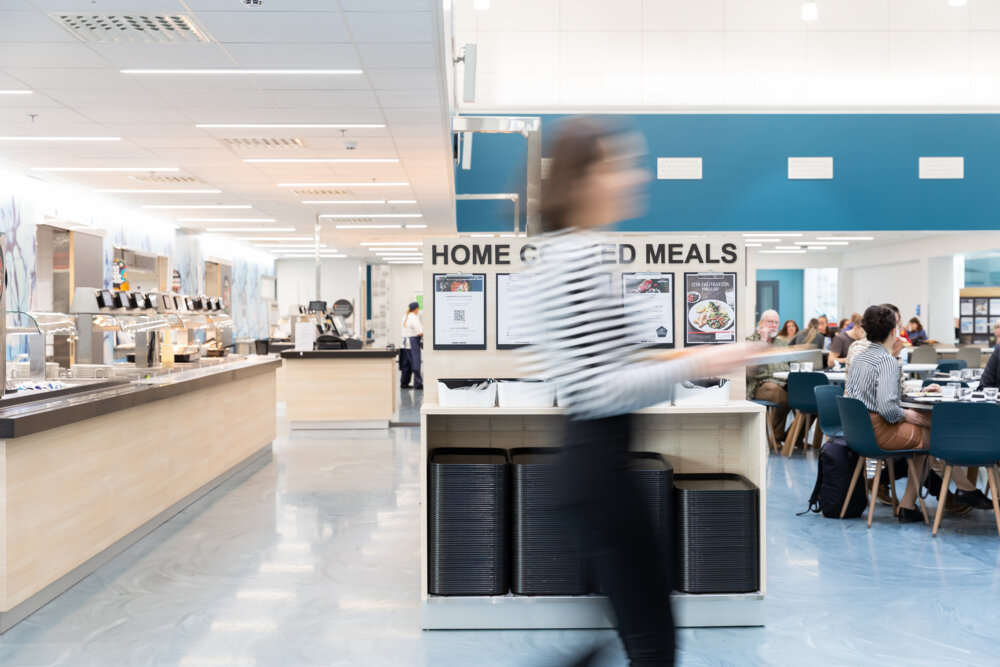- CONSORTIUM
KONE, JAMIX, Sodexo, METOS, SYK, Smartkichen, Haltian, Safera
- SEMINAR’s focus
Reflect upon data ecosystems and data traceability
- DESCRIPTION
Dining Flow is a Business Finland-funded project focused on improving both diner and service provider experiences while promoting sustainability in Self-Service Restaurants (SSRs). The project achieves these goals by providing service providers with practical, data-driven decision-support tools. These tools and solutions are developed through an analysis of and diner’s activities in the dining area, combined with data from SSR stakeholders, equipment, and the surrounding environment (including buildings and their users).
Dining Flow currently gathers data from the research restaurant Flavoria (https://www.flavoria.fi), tracking metrics such as food consumption and plate-level food waste. Additionally, we have access to other relevant data, including energy consumption, noise levels, movement of potential diners within the building (like entrances and elevator usage), etc. By combining these data sources, we are developing models to improve predictions of daily diner turnout.
- CHALLENGE
We know that data is important . The value of the data increases in the creation of innovative application where diverse data sources are mixed to produce new solutions. However there are many challenges when we build data ecosystems, such as data traceability and traceability of data.
Traceability data is usually product-focused, ensuring transparency in a supply chain or lifecycle, while data traceability is data-focused, ensuring that the data’s origin, changes, and path are accurately tracked for integrity and governance. When focusing on the food sector we find the following challenges.
Challenges of Traceability Data in the Food Sector:
-
- Fragmented Supply Chains: With multiple stages, from farming to retail, data must be consistently recorded, shared, and validated across various independent parties.
- Inconsistent Standards: Different countries and suppliers may follow varying protocols and standards, making it difficult to achieve seamless traceability.
- Real-Time Tracking Limitations: Capturing and updating data in real-time is challenging, particularly with perishable goods that move quickly through the supply chain.
- Data Accuracy and Reliability: Errors in data entry, outdated systems, and manual processes can lead to inaccuracies that impact traceability and compliance.
Challenges of Data Traceability (or Traceability of Data) in the Food Sector:
-
- Data Privacy Regulations: Complying with regulations like GDPR while maintaining traceability is complex, especially when handling personal or sensitive data.
- High Data Volume: Managing vast amounts of data generated across all stages of the food chain, including storage and processing, can be resource-intensive.
- Ensuring Data Integrity: Verifying that data remains accurate and unaltered from origin to end-point is essential, especially for food safety and quality assurance.
- Data Ownership and Accountability: Determining who is responsible for maintaining data traceability at each stage can be challenging, especially in shared or distributed systems.
Task for the session
-
- To explore and reflect upon current national efforts in the topic of traceability of data and data ecosystems.
- To open the conversation about how to address traceability of data.
Outcome
-
- After the pre-assignment, the participation in the seminar session and post-assignment, we expect that each participants gain an understanding and awareness of the challenge of the role of data when addressing to diminish food waste.
- DAY and TIME
Friday November 22nd from 9:30 to 12:00 hrs
- SEMINAR LOCATION and SCHEDULE
Venue: University of Turku, Natura building, lecture hall XV
The session takes place in the Dining Flow event. Therefore, we will follow on the event’s agenda:
9:30 – 10:00 am – Nametags and networking, coffee, tea and pulla.
10:00 – 10:10 am – Opening and welcoming, Jaakko Järvi, Dean, Faculty of Technology
10:10 – 10:40 am – Simon Panelius, CGO of Infine
10:40 – 11:10 am. – Creating a data ecosystem – experiences from Traffic Data Ecosystem” by Janne Lautanala, Chief Ecosystem and Technology Officer, Fintraffic
11:10 – 11:40 am –Panel discussion. Jere Vuorenala (KONE), Timo Lehto (Jamix), Simon Panelius (Infine) and Janne Lautanala (Fintraffic). Niko Myller (UTU), facilitator.
11:40 – 12:00 pm –Final remarks
After the seminar session, course participants enrolled in the event, will receive their post-assignment.
- ENROLLMENT
Please enroll to the seminar session by filling the following form: https://link.webropol.com/ep/diningflow02
The enrollment closes on Wednesday November 20.
- PRE-ASSIGNMENT
Pre-assignment is due on Nov 21.
To get the most out of the seminar we have three task for you.
Task 1. Theoretical work in Food Forecasting.
The participants of the seminar have different backgrounds, therefore it is important that all of us gain a basic understanding of certain terms for our session. Based on your own discipline find three relevant academic articles addressing food demand forecasting in restaurants. The papers you select can be within your discipline. Once you select these articles and read them, write briefly:
1.1) Reference to the article.
1.2) Why do you select these articles?
1.3) How do the article contribute in the demand forecasting in restaurants?
Task 2. Brief Benchmarking
Find two software companies with the European Union which work in the traceability of
food from the providers of restaurants. Once you find these companies report:
2.1) Name and website of the company.
2.2) Brief description of the company.
2.3) If the company describes how they trace data, then briefly describe it.
Task 3. Data Set
Explore an open dataset, within Finland or EU, which offers information that can be linked
to food demand forecasting or traceability of data in food. In the report indicate:
3.1) The name of the organization where you find the dataset,
3.2) Leave the link to the dataset
3.3) Write briefly what features you detect as more relevant and why.
